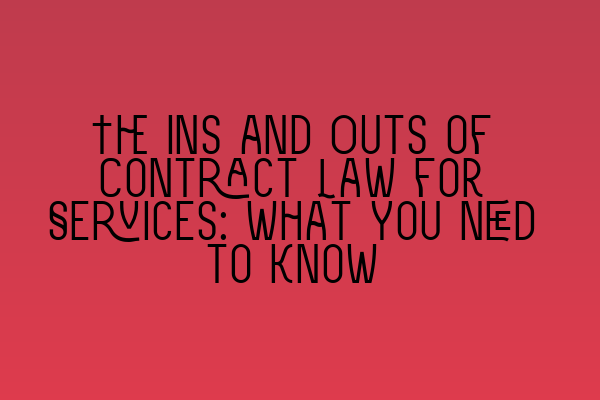The Ins and Outs of Contract Law for Services: What You Need to Know
Contract law is a fundamental aspect of any legal system, and understanding the intricacies of contracts is essential for anyone involved in business or commercial activities. In this article, we’ll delve into the ins and outs of contract law in the context of services, providing you with a comprehensive overview of what you need to know.
What is a Contract?
Let’s start with the basics – what exactly is a contract? In simple terms, a contract is a legally binding agreement between two or more parties that sets out their rights and obligations. Contracts can cover a range of transactions, including the provision of goods or services, employment agreements, leases, and more.
Key Elements of a Contract
To be legally enforceable, a contract must contain certain key elements:
- Offer and Acceptance: There must be a clear offer made by one party and an unequivocal acceptance by the other party.
- Consideration: Both parties must exchange something of value, whether it be goods, services, money, or promises.
- Intention to Create Legal Relations: The parties must intend for the contract to have legal consequences. Agreements between friends or family members, for example, may not be legally binding.
- Capacity: The parties involved must have the legal capacity to enter into a contract. This means they must be of legal age and mentally competent.
- Compliance with Formalities: Some contracts, such as those involving the sale of land or the provision of certain services, may require specific formalities to be followed.
These elements form the foundation of a valid contract, ensuring that both parties are bound by the terms they have agreed upon.
Types of Contract for Services
When it comes to services, there are several types of contracts that you may encounter:
- Service Contracts: These contracts outline the provision of specific services from one party to another. They often include details such as the scope of work, payment terms, and timelines. SQE 1 Preparation Courses
- Professional Service Contracts: These contracts are similar to service contracts but are specific to professional services such as legal, accounting, or consulting services. They may include provisions for confidentiality, liability, and termination. SQE 2 Preparation Courses
- Subcontracting Agreements: In some cases, service providers may engage subcontractors to assist in the delivery of services. Subcontracting agreements set out the terms between the primary contractor and the subcontractor.
- Service Level Agreements (SLAs): SLAs are commonly used in the IT industry to define the level of service expected from a service provider. They often include metrics, response times, and penalties for non-compliance.
These are just a few examples of contract types for services. The specific type of contract you’ll need will depend on the nature of the services being provided and the parties involved.
Important Contract Terms
Contracts for services typically include a range of important terms that help to define the rights and obligations of the parties involved. These terms may include:
- Scope of Work: This outlines the specific services to be provided, including any deliverables or milestones.
- Payment Terms: The contract should clearly state the payment amount, schedule, and any applicable late fees or interest.
- Term and Termination: Contracts typically specify a term, which is the duration of the agreement. They should also include provisions for termination, including notice periods and grounds for termination.
- Intellectual Property: If the services involve the creation of intellectual property, such as software code or designs, the contract should address who owns the rights to that property.
- Confidentiality: Contracts often include provisions to protect the confidentiality of sensitive information shared between the parties.
- Indemnification: To protect against potential liabilities, contracts may include clauses specifying that one party will indemnify the other for any losses arising from the services provided.
- Dispute Resolution: Contracts should include provisions for resolving disputes, such as through mediation, arbitration, or litigation.
These terms help to ensure that both parties understand their rights and obligations under the contract and provide a framework for effective service delivery.
Enforceability of Contracts
For a contract to be enforceable, it must meet certain criteria:
- Free Consent: The parties must enter into the contract willingly and without duress or undue influence.
- Legal Object: The purpose of the contract must be legal. Contracts that involve illegal activities are not enforceable.
- Legality of Form: Some contracts may require specific formalities, such as being in writing or signed by both parties.
If any of these criteria are not met, the contract may be considered void or voidable, meaning that it is not legally binding or may be terminated under certain circumstances.
Conclusion
In summary, contract law for services is an essential aspect of commercial and business activities. Understanding the key elements of a contract, the different types of contracts for services, and the important terms to include can help ensure that your contracts are legally enforceable and provide a solid foundation for successful service delivery.
To explore further, check out these related articles:
